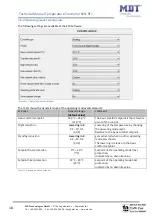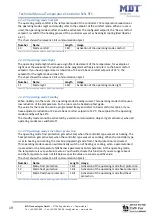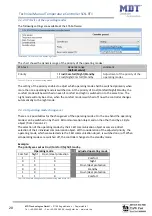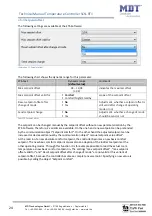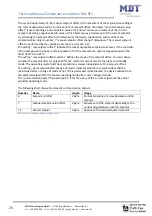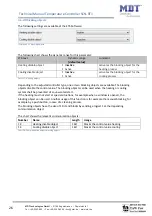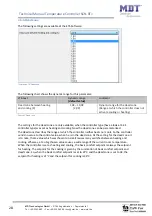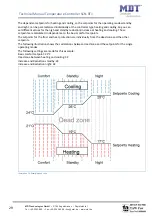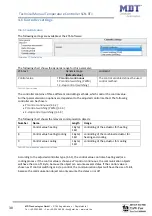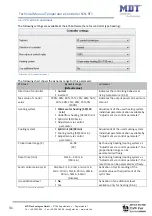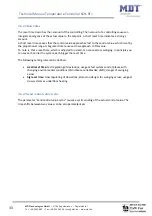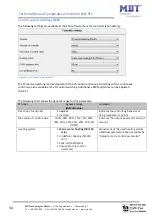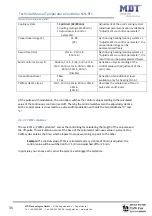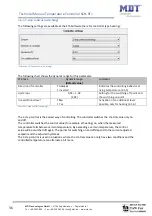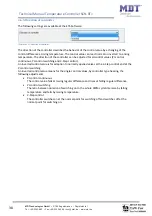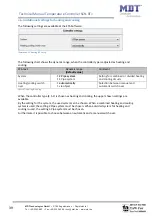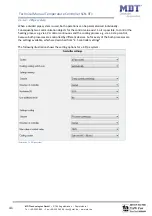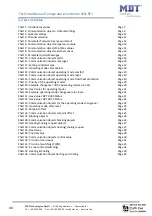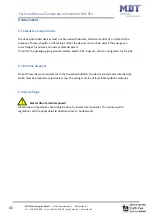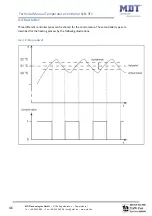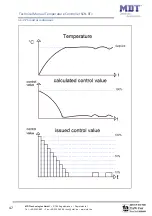
Technical
Manual
Temperature
Controller
SCN
‐
RT1
MDT technologies GmbH •
51766 Engelskirchen • Papiermühle 1
Tel.: +49-2263-880 • Fax: +49-2263-4588 • [email protected] • www.mdt.de
32
The
PI
control
continuous
is
a
continuous
controlling
with
proportional
amount,
the
Proportional
range,
and
an
integral
amount,
the
reset
time.
The
size
of
the
proportional
range
is
indicated
in
K,
whereas
the
I
‐
amount
is
indicated
in
minutes.
The
control
value
is
controlled
in
steps
from
0%
to
the
adjusted
maximum
(have
a
look
at
4.5.2.1
Max
value
of
control
value)
for
the
PI
‐
control.
A
big
deviation
causes
at
normal
direction,
a
big
control
value
to
eliminate
the
deviation
as
fast
as
possible.
4.6.2.1
Max
value
of
control
value
By
the
setting
“Max
value
of
control
value”
can
be
adjusted
which
maximum
value
the
control
value
can
assume.
To
prevent
switching
processes
at
large
control
values,
a
maximum
can
be
defined
by
the
setting
“Max
value
of
control
value”.
So
the
control
value
cannot
exceed
this
value.
4.6.2.2
Heating/
cooling
system
The
control
parameter
(P
‐
amount
and
I
‐
amount)
are
adjusted
by
the
setting
for
the
used
heating/
cooling
system.
You
can
use
preset
values,
which
fit
to
determined
heating
or
cooling
systems,
or
parameterize
the
proportional
range
and
the
reset
time
freely.
The
preset
values
for
the
corresponding
heating
or
cooling
system
are
based
on
empirical
values
and
lead
often
to
good
controlling
results.
By
choosing
“Adjustment
via
control
parameter”,
the
proportional
range
and
the
reset
time
can
be
parameterized
freely.
This
setting
requires
a
good
knowledge
in
the
field
of
control
technology.
4.6.2.3
Proportional
range
The
proportional
range
describes
the
P
‐
amount
of
the
controlling.
The
P
‐
amount
produces
a
proportional
increment
to
the
deviation
of
the
control
value.
A
small
proportional
range
causes
a
short
recovery
time
of
the
deviation.
The
controller
reacts
thereby
almost
immediately
and
sets
the
control
value
already
at
a
small
deviation
almost
to
the
maximum
value
(=100%).
If
the
proportional
range
is
chosen
too
small,
the
system
will
swing
across.
The
following
setting
rules
can
be
defined:
small
proportional
range:
swing
across
possible
at
change
of
setpoint;
usage
at
fast
systems;
small
recovery
times
big
proportional
range:
almost
no
danger
of
swing
across;
long
recovery
times,
usage
at
slow
systems
which
need
huge
amplifications
(big
heating
power
etc.)

